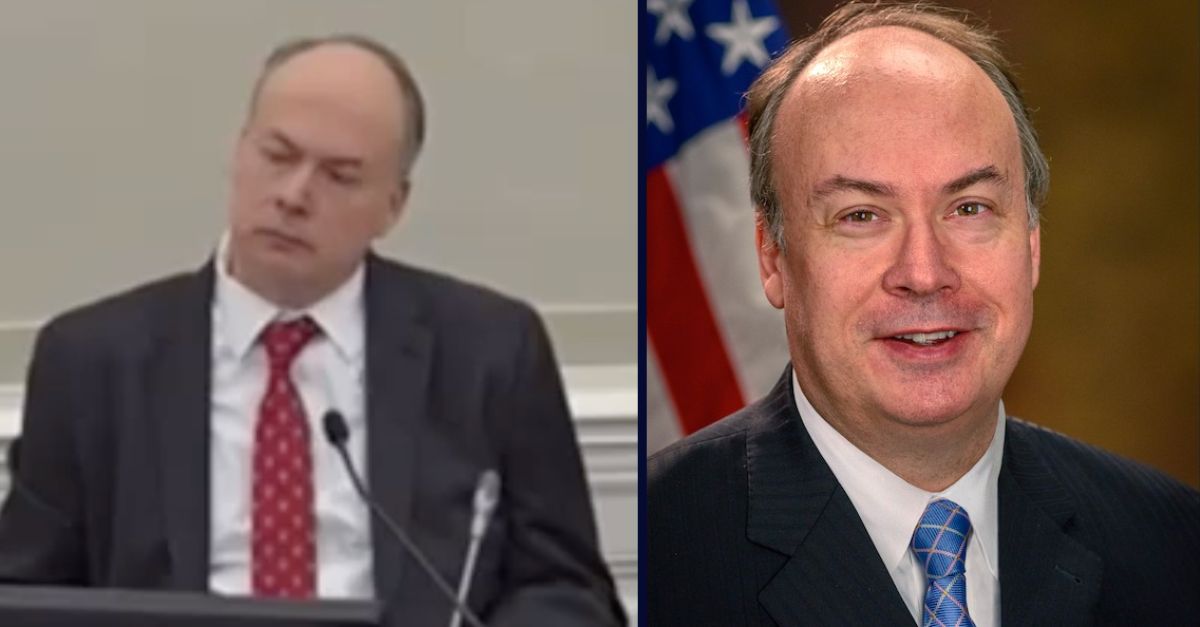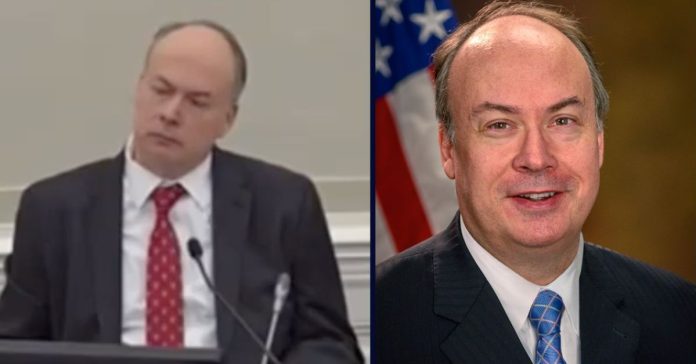
Left: Jeffrey Clark during his bar disciplinary hearings on March 27, 2024 (D.C. Bar Office of Disciplinary Counsel); Right: Jeffrey Clark in his DOJ profile photo (U.S. Department of Justice)
Former U.S. Department of Justice attorney Jeffrey Clark repeatedly invoked his Fifth Amendment right to remain silent during a Wednesday disbarment hearing in the nation’s capital.
Clark briefly testified during disciplinary hearings where his law license is on the line over his efforts to help Donald Trump overturn the results of the 2020 presidential election. The proceedings in the case against the lawyer are long delayed — the D.C. Bar Office of Disciplinary Counsel filed ethics charges against him in July 2022.
When posed numerous questions by disciplinary counsel Hamilton Fox III, the pro-Trump lawyer invoked his constitutional right to remain silent — and often cited a host of other privileges, sometimes on the advice of counsel, in order to refrain from giving detailed answers.
“Mr. Fox, the same answer,” Clark replied in response to several questions. “The Fifth Amendment privilege at this time. The executive privilege. The law enforcement privilege. The deliberative process privilege and attorney-client privilege.”
Clark is an environmental lawyer whom Trump nearly tapped to be acting attorney general in his scramble to retain the presidency after losing to Joe Biden in the 2020 election. He also previously worked as an assistant attorney general at one sub-agency within the DOJ and as an acting assistant attorney general within another.
On Wednesday, peppered with question after question by Fox, Clark invoked the Fifth Amendment in various iterations. And the contents of the questions did not really seem to matter much.
Asked when he first met Trump, for instance, he said: “I will plead the Fifth.”
And sometimes, he even had fun with his stock response of remaining silent and asserting privilege after privilege.
“A veritable phalanx of privileges,” Clark joked.
The bar charges he faces are focused on an unsent draft letter falsely claiming the department “identified significant concerns that may have impacted the outcome of the election in multiple states, including the state of Georgia.”
The specification of charges said that Clark violated D.C. Rules of Professional Conduct 8.4(a) and (c) (“in that respondent attempted to engage in conduct involving dishonesty, by sending the proof of concept letter containing false statements”) and Rules 8.4(a) and (d) (“in that respondent attempted to engage in conduct that would seriously interfere with the administration of justice”). The so-called “proof of concept letter” is the draft Clark compiled that would have urged legislatures in states where Trump lost to “send an unauthorized slate of electors to Congress,” according to the charges.
Identified as a “witness” during the hearing livestreamed on Zoom, Clark’s decision to plead the Fifth Amendment can be viewed through the prism of his legal jeopardy in Fulton County, Georgia, where he is one of the co-defendants in the racketeering (RICO) and election subversion case against his former boss.
Notably, Clark is also an integral aspect of special counsel Jack Smith’s D.C.-based case against the 45th president — and last month sought to delay his bar hearings over developments in Trump’s case.
That latest effort — unlike several earlier dilatory tactics undertaken by Clark months and even years ago — did not pan out.
Trump, however, injected himself into Clark’s proceedings — with the ex-president’s attorneys, in a letter, instructing the former DOJ lawyer “to maintain President Donald Trump’s executive privilege and other related privileges, including law enforcement privilege, attorney client privilege, and deliberative process privilege.”
Pleading the Fifth Amendment is nothing new for Clark — he invoked his constitutional right over 100 times in February 2022 when deposed by investigators for the House Jan. 6 Committee.
Clark’s behavior on Wednesday, while not fully illuminating, did draw attention and eventually led to at least one substantive answer.
“Mr. Clark, you asserted a number of times the attorney-client privilege,” D.C. Bar Committeewoman Patricia Matthews began. “For whom were you the attorney?”
To which Clark replied: “For President Trump, the head of the executive branch, the sole head, the unitary head of Article Two, the executive branch of the United States government.”
“So, throughout this whole process, that was your client?” Matthews attempted to follow up.
Clark’s attorney, Harry MacDougald, interjected and advised his client to, once again, invoke the Fifth Amendment.
The pro-Trump lawyer then asked the committeewoman to repeat her question, which she did.
Clark replied: “So, I provided an answer in this area. But I agree with my counsel that as to any inquiry as to how the privilege was formed, etc. —”
Matthews took the opportunity to interject and then asked her question a third time.
Again Clark replied: “I would respond to that by invoking the same grouping of privileges, with all due respect, the Fifth Amendment privilege at this time. The executive privilege. Law enforcement privilege. Deliberative process privilege and the attorney-client privilege.”
Have a tip we should know? [email protected]

